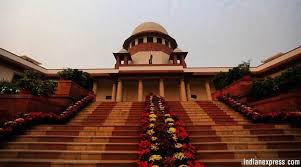The Impugned Orders have given rise to significant questions about the separation of powers, the exercise of criminal contempt jurisdiction, and the practice of frequently summoning government officials to court. (Para 2)
By its order dated 4 April 2023, [“First Impugned Order”] the High Court directed the Government of Uttar Pradesh to inter alia notify rules proposed by the Chief Justice of the High Court pertaining to ‘Domestic Help to Former Chief Justices and Former Judges of the Allahabad High Court’ by the next date of hearing. The High Court further directed certain officials of the Government of Uttar Pradesh to be present before the court on the next date if the order was not complied with. (Para 3)
The State of Uttar Pradesh moved an application before the High Court to seek a recall of the Order dated 4 April 2023 highlighting legal obstacles in complying with the directions of the High Court. By its order dated 19 April 2023, [“Second Impugned Order”] the High Court held that the recall application was ‘contemptuous’ and initiated criminal contempt proceedings against various officials of the Government of Uttar Pradesh. The officials present in the court, including the Secretary (Finance) and Special Secretary (Finance) were taken into custody and bailable warrants were issued against the Chief Secretary and the Additional Chief Secretary (Finance). (Para 4)
In a nutshell, the conclusions reached in this Judgement are as follows:
a. The High Court did not have the power to direct the State Government to notify Rules proposed by the Chief Justice pertaining to post-retiral benefits for former Judges of the High Court. The Chief Justice did not have the competence to frame the rules under Article 229 of the Constitution. Further, the High Court, acting on the judicial side, does not have the power to direct the Government to frame rules proposed by it on the administrative side.
b. The power of criminal contempt could not be invoked by the High Court against officials of the Government of Uttar Pradesh on the ground that the application for recall of the First Impugned Order was ‘contemptuous’. The actions of the officials do not meet the standard of both ‘criminal contempt’ and ‘civil contempt’.
c. The conduct of the High Court in frequently summoning government officials to exert pressure on the government, under the threat of contempt, is impermissible. Summoning officials repeatedly, instead of relying on the law officers representing the government or the submissions of the government on affidavit, runs contrary to the scheme envisaged by the Constitution.
d. The SOP on Personal Appearance of Government Officials in Court Proceedings framed by this Court in Para 45 of this Judgement must be followed by all courts across the country. All High Courts shall consider framing rules to regulate the appearance of Government officials in court, after taking into account the SOP which has been formulated above.
SUPREME COURT OF INDIA
2024 STPL(Web) 9 SC
[2024 INSC 4]
State Of Uttar Pradesh & Ors Vs. Association Of Retired Supreme Court And High Court Judges At Allahabad & Ors
Civil Appeal Nos 23-24 of 2024 Special Leave to Appeal (C) Nos. 8575-8576 of 2023-Decided on 03-01-2024.
https://stpllaw.in/wp-content/uploads/2024/01/2024-STPLWeb-9-SC.pdf







